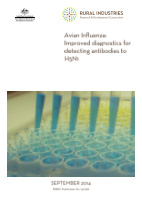Highly pathogenic avian influenza (HPAI) viruses such as H5N1 are capable of causing up to 100% mortality in chicken flocks. Although HPAI viruses are of major concern to the poultry industry, it’s their potential to infect humans that necessitates rapid control and eradication strategies. Ideally early detection and stamping out is the preferred method of controlling HPAI. However, failure to contain the disease may necessitate the vaccination of broiler breeders and layers. Vaccination has been shown to be effective at eradicating HPAI but only when used in combination with serological monitoring to detect field exposure to HPAI through a process called DIVA – differentiating infected from vaccinated animals. Unfortunately, many of the serological tests available have limitations in terms of sensitivity and/or specificity, while others are expensive and require specialised personnel to perform and interpret the tests. Hence the aim of this project was to develop a competition based ELISA which could detect antibodies to H5N1 enabling the differentiation of vaccinated and infected chickens.





